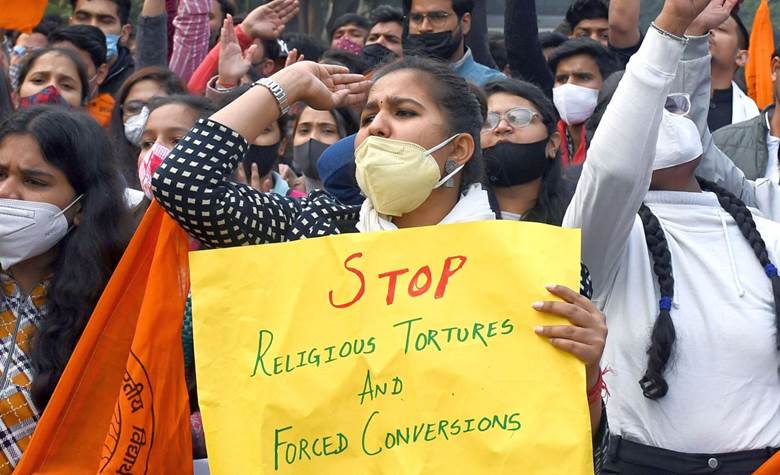Description

Copyright infringement not intended
In News
- The Supreme Court of India stated that “religious conversions by means of force, allurement or fraud may “ultimately affect the security of the nation and freedom of religion and conscience of citizens”.
- The court also directed the Union Government to “step in” and clarify what it intends to do to curb compulsory or deceitful religious conversions.
- The court highlighted that “There may be freedom of religion but there may not be freedom of religion by forced conversion… This is a very serious issue. Everybody has the right to choose their religion, but not by forced conversion or by giving temptation”.
Constitutional Articles related to Freedom of Religion
- Article 25 says that all persons are equally entitled to freedom of conscience and the right to freely profess, practice and propagate religion.
- Freedom of conscience: Inner freedom of an individual to frame his relation with God or Creatures in whatever way he desires.
- Right to Profess Declaration of one’s religious beliefs and faith openly and freely.
- Right to Practice: Performance of religious worship, rituals, ceremonies and exhibition of beliefs and ideas.
- Right to Propagate: Transmission and promotion of one’s religious beliefs to others. But, it does not include a right to convert another person to one’s religion.
- Article 25 covers religious beliefs and also religious practices (rituals).
- Article 26: Freedom to Manage Religious Affairs, every religious denomination or any of its sections shall have the following rights:
- Right to establish and maintain institutions for religious and charitable purposes.
- Right to manage its affairs in matters of religion.
- Right to own and acquire movable and immovable property.
- Right to administer such property under the law.
- Article 27 - Freedom from Taxation for the Promotion of a Religion
- No person shall be forced to pay any taxes for the promotion or maintenance of any particular religion or religious denomination.
- The State should not spend the public money collected by way of tax for the promotion or maintenance of any particular religion.
- This provision prohibits the State from favouring and supporting one religion over the other. This also means that taxes can be used for the promotion or maintenance of all religions.
- This provision prohibits only the levy of a tax and not a fee.
- Article 28 - Freedom from Attending Religious Instruction
- No religious instruction shall be provided in any educational institution wholly maintained out of State funds.
- No person attending any educational institution recognised by the State or receiving aid out of State funds shall be required to attend any religious instruction or worship in that institution without his consent.
- Article 29 - Protection of Interests of Minorities
- It provides that any section of the citizens residing in any part of India having a distinct language, script or culture of its own, shall have the right to conserve the same.
- No citizen shall be denied admission into any educational institution maintained by the State or receiving aid out of State funds on grounds only of religion, race, caste, or language.
- These rights are subject to public order, morality, health and other provisions relating to fundamental rights.
- The State is permitted to regulate or restrict any economic, financial, political or other secular activity associated with religious practice.
Forced conversion is the adoption of a different religion or the adoption of irreligion under duress. At the central level, India does not have any law which provides any sanction in case of forcible conversions. In 1954, an attempt was made to pass the Indian Conversion (regulation and registration bill) but Parliament failed to pass it due to heavy opposition. The need of the hour is to pass a strict anti-conversion bill to curb forced conversion in society.

Arguments in Favor of the anti-conversion bill
- These laws only ban and punish forceful religious conversion.
- Fundamental rights under Article 25 ‘Right to propagate a religion” did not extend to forced conversions.
- There is no fundamental right to convert another person to one's religion.
Arguments against the anti-conversion bill
- According to some activists “, Such laws are used to target religious minorities and interfaith couples”.
- These laws would be used to target even voluntary conversions and curb the fundamental rights of “Freedom of conscience” under Article 25.
- These Acts do not satisfy the test of reasonableness and fairness and also go against the fundamental rights under Article 14 and Article 21” of the Constitution.
Way forward
- Anti-conversion laws have been challenged in courts ever since Odisha moved the first such legislation in 1967. However, the courts have a mixed record defending the freedom of choice with regard to religion, ruling in favour of individual liberty in some cases but not in others.
- The High Court on many occasions clearly said that while a person has the right to believe and the right to change their beliefs, they also have a right to keep their beliefs secret.
https://epaper.thehindu.com/reader
https://t.me/+hJqMV1O0se03Njk9















